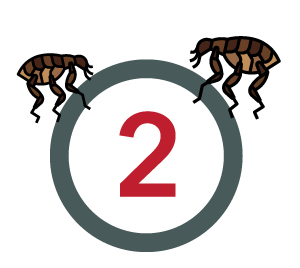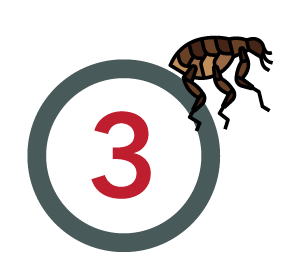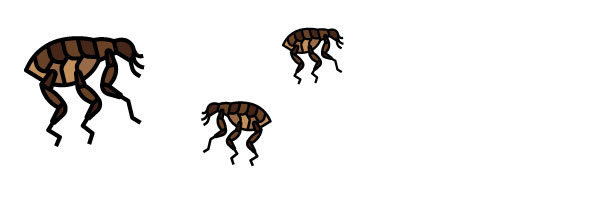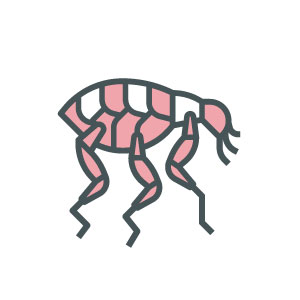Flea Removal Experts
All treatments come with a guarantee and an expert Flea removal specialist.
Same day callouts available today!
Same day callouts available today!
April 16, 2024
Email us to book an appointment
We specialise in Flea control & removal
Have you found Flea's?

Step 1
You can either call us on
0800 592011 or fill out our simple contact form.

Step 2
One of our pest control experts will call you or reply via email to arrange the appointment instantly.

Step 3
ASW'S technician will carry out the required visits and we will be at the end of the phone if you need us.
Flea Treatment Options
Fleas are best treated before their numbers reach epidemic proportions, but many people wait until the situation becomes unbearable. A common mistake is to treat the pets themselves as well as their bedding when it becomes obvious that intervention is necessary. Although this is a great start, it isn’t enough. Successfully winning the war on fleas means treating inside your property in away designed to kill the insects in every stage of their development. Otherwise, the situation just becomes a vicious cycle.
Fleas are small, wingless, hard-bodied insects that move quickly and are highly prolific. They bite wild animals, domestic pets, and humans. Their bites often cause severe itching, particularly when multiple bites are part of the picture.
Fleas have the potential to transmit bacterial infections, disease, and internal parasites. The itching caused by their bites often results in secondary infections and skin damage caused by scratching.
Flea infestations that are left untreated quickly spiral out of control, and pet owners should be aware that the visual presence of even one lone flea usually means that there are hundreds, or perhaps even thousands, that you don’t see.
Fleas Like It Hot
Fleas can be especially difficult to get rid of during the hottest part of summer because they thrive in high temperatures. Furthermore, they reproduce so quickly during the height of summer that successfully getting their population in check can feel nearly impossible. Although many consumers turn to home remedies and over-the-counter pest control products to combat fleas, these aren’t strong enough to stop a fully fledged flea infestation. Each individual female flea lays up to 50 eggs per day, and these eggs wind up distributed all over the home.
Even if your pets live exclusively outdoors, fleas and their eggs easily hitch rides inside on clothing, soles of shoes, towels, and anything else that goes from outdoors into the home interior. Fleas find indoor conditions very comfortable, and colonies quickly develop and begin to multiply. Besides, outdoor pets can suffer greatly from fleas if left untreated, so it’s a good idea to take pest control measures for their benefit.

How We Can Help?
ASW Pest Control is standing by to help you solve all of your pest control needs, including all pests in our services page for any other pests that are having a negative effect on your quality of life.
Information
Cat Flea (Ctenocephalides Felis)
Fleas are parasitic as adults feeding on blood from a variety of mammalian hosts including humans.

Appearance
- Adult fleas are around 2mm long, dark brown in colour with no wings. They are flattened laterally with long hind legs for jumping. The larvae are around 5mm long and pale in colour and are found in hosts bedding or in cracks in floorboards.
Control
- Control of fleas on host animals can only be done using veterinary products such as flea drops, collars and shampoos.
- Regular vacuuming of property and hot washing of animal bedding will help reduce larvae. This should be carried out prior to a technicians visit and any contents of vacuum disposed of in an external bin. Treatment of property will require the use of residual insecticide, occasionally a further visit is required to eliminate the fleas where exposed floorboards allow fleas to hide below.
Life Cycle
- Fleas feed on blood from their hosts.
- Female fleas can lay around 1000 eggs in the fur of their host, this occurs after a blood meal, these are 1mm and white in colour. They usually drop off the host onto bedding or floor areas and hatch after a few days. The larvae feed on adult flea droppings and go through 2-3 moults and are fully grown in around 3 weeks. They then spin a cocoon to pupate into adults after 2-4 weeks and hatch in response to vibrations. This can be delayed by several months if not stimulated.
Flea Preparation before treatment can
be carried out.
- VACUUM – All carpets, rugs, and furniture, especially between and under cushions. Be sure to dispose of vacuum bag when completed.
CLEAN AND CLEAR ALL FLOORS – Even closet floors must be cleared of all objects to give your pest control professional access to all floor surfaces. Mop all tile, laminate and vinyl floors. Sweep all concrete floors.
REMOVE PETS – Pets cannot remain in the home during the treatment. Fish bowls and aquariums may remain if properly covered. Air supply must be turned off, and the aquarium must be completely covered with a towel or sheet.
CLEAN PET BEDDING – All pet bedding must be washed or disposed of. If laundering, wash pet bedding separately from other linens.
Normal vacuuming can be resumed 2 weeks after your home has been treated
- Residents and pets must be out of the home for 3 hours after service is performed.
Recommendations after flea treatment
- The premises must be vacated for a minimum of 3 hours after treatment.
- On your return to the premises, windows should be opened to ventilate the treated rooms
- You do not vacuum, wash or clean for 2 weeks after treatment
- The floors of your property will be covered by a layer of insecticide which is odourless and invisible. It has a very good residual effect which means that it will continue to work for some time if left undisturbed.
- Adult fleas will be killed within a few days but the floor should not be vacuumed, swept or washed for at least two weeks after treatment because there will still be eggs which will continue to hatch.
- As eggs hatch and develop, you might find fleas reappearing 10-14 days after treatment – this is quite normal and provided the insecticide remains in place it will kill them. This is why it is important not to carry out cleaning which might remove insecticide.
- If you do have a pet it should also be treated for fleas immediately, using a treatment recommended by your vet.
- If you find you still have fleas four weeks after this treatment please contact us and we will arrange for a Pest Control Officer to investigate.

“Very professional and dealt with the problem efficiently and quickly. Very knowledgeable on his subject and gave lots of advice on how to solve the problem, not just deal with what was happening at the time. Would definitely use again.”





